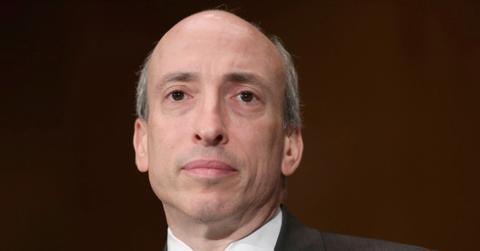Gary Gensler Details Agenda As SEC Chair, Including Potential Crypto Regulation
What’s Gary Gensler’s net worth? Learn more about the SEC chair, who has discussed potential cryptocurrency regulation in a new interview.
Jan. 11 2022, Published 2:40 a.m. ET

Following Gary Gensler’s appearance on CNBC on Jan. 10, 2022, we’re rounding up more information on the U.S. SEC chair, including his net worth, career, and latest comments on regulation.
Gary Gensler
Chair of the U.S. SEC, former investment banker
Net worth: $41 million–119 million as of Feb. 2021
Gary Gensler is a former investment banker who worked as a partner at Goldman Sachs before entering public service. He currently serves as the chair of the U.S. SEC. He formerly served as undersecretary of the Treasury for Domestic Finance, assistant secretary of the Treasury, and chair of the U.S. Commodity Futures Trading Commission.
Birthdate: Oct. 18, 1957
Hometown: Baltimore, Md.
Education: B.A. in economics and MBA from the Wharton School of the University of Pennsylvania
Spouse: Artist Francesca Danieli (1986–2006, her death)
For starters, Gensler is taking a tough approach to Wall Street regulation, telling NPR in Dec. 2021 that he’s concerned about amateur investors not having enough protection when they invest in cryptocurrencies and SPACs. “The basic bargain or tenet of our capital markets is that investors should get full and fair information,” he said. “And two, that they are protected against fraud and manipulation.” Here’s more info about the 64-year-old.
Gensler has a “robust” agenda as the SEC chair—and a sizable net worth as an investor

Gensler, who was sworn into office at the SEC in April 2021, got his MBA at the Wharton School of the University of Pennsylvania. He then started his financial career at Goldman Sachs, where he became a partner and the co-head of finance, according to his government bio.
In the public sector, Gensler served as undersecretary of the Treasury for Domestic Finance and assistant secretary of the Treasury between 1997 and 2001, and during the Obama administration, he chaired the U.S. Commodity Futures Trading Commission.
Now that Gensler is heading the SEC, his ambitious goals for the commission has some Wall Street experts amazed. “I’m staggered, as someone who has been watching the SEC for half a century now, that the agenda is so robust, and there is so much energy behind it,” James Cox, a professor of corporate and securities law at Duke University, told NPR. “I’m thinking that, not only does Gary Gensler work seven days a week, but I think he works 26 hours a day.”
According to financial disclosures filed with the Office of Government Ethics and cited by The Wall Street Journal, Gensler's net worth was between $41 million and $119 million in Feb. 2021, with most of his earnings coming from investment income.
He wants private companies to offer stakeholders more information
On Jan. 10, 2022, Gensler said on CNBC’s Squawk Box that he wants large private companies and private equity firms—whose investors include public pension funds—to give stakeholders enough information to make informed decisions. “We’ve long had both public companies and private companies. And we’ve said, if you want to tap into the broad public [for capital], there’s a basic bargain: Share information, disclose information that’s important to that investor,” Gensler said.
He also said on Jan. 10 that potential crypto regulation is within securities laws “because Congress … wanted to protect you, the investing public, so that you have proper information … and protect you against fraud and scammers and the like.”
He went on to say, “It’s a simple, basic idea. You get to decide whether you want to invest in this security or that security—and if they call themselves a token, they’re still probably, possibly, a security. You get to decide, but there needs to be some basic disclosures and protection against lies and frauds.”
